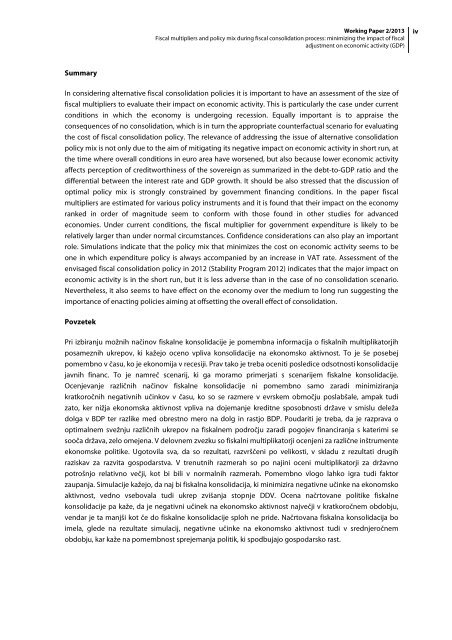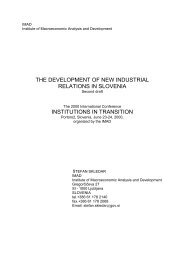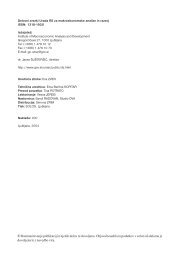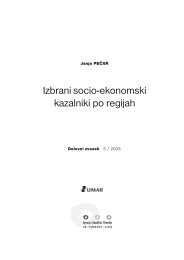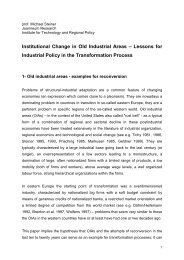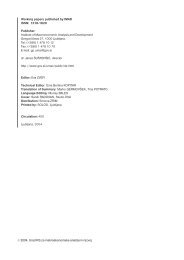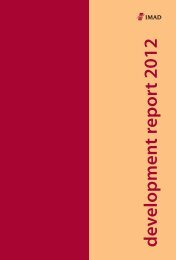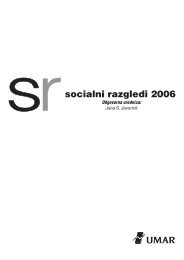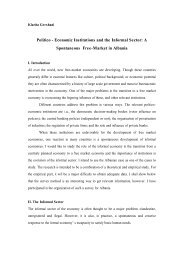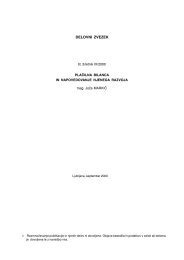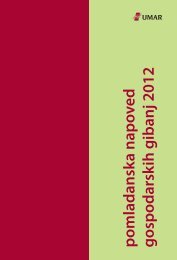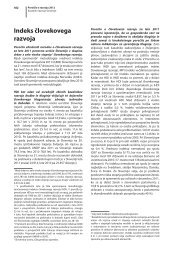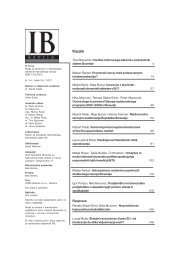Gonzalo C. Caprirolo and Marko Glažar Fiscal multipliers ... - UMAR
Gonzalo C. Caprirolo and Marko Glažar Fiscal multipliers ... - UMAR
Gonzalo C. Caprirolo and Marko Glažar Fiscal multipliers ... - UMAR
Create successful ePaper yourself
Turn your PDF publications into a flip-book with our unique Google optimized e-Paper software.
Working Paper 2/2013<br />
<strong>Fiscal</strong> <strong>multipliers</strong> <strong>and</strong> policy mix during fiscal consolidation process: minimizing the impact of fiscal<br />
adjustment on economic activity (GDP)<br />
iv<br />
Summary<br />
In considering alternative fiscal consolidation policies it is important to have an assessment of the size of<br />
fiscal <strong>multipliers</strong> to evaluate their impact on economic activity. This is particularly the case under current<br />
conditions in which the economy is undergoing recession. Equally important is to appraise the<br />
consequences of no consolidation, which is in turn the appropriate counterfactual scenario for evaluating<br />
the cost of fiscal consolidation policy. The relevance of addressing the issue of alternative consolidation<br />
policy mix is not only due to the aim of mitigating its negative impact on economic activity in short run, at<br />
the time where overall conditions in euro area have worsened, but also because lower economic activity<br />
affects perception of creditworthiness of the sovereign as summarized in the debt-to-GDP ratio <strong>and</strong> the<br />
differential between the interest rate <strong>and</strong> GDP growth. It should be also stressed that the discussion of<br />
optimal policy mix is strongly constrained by government financing conditions. In the paper fiscal<br />
<strong>multipliers</strong> are estimated for various policy instruments <strong>and</strong> it is found that their impact on the economy<br />
ranked in order of magnitude seem to conform with those found in other studies for advanced<br />
economies. Under current conditions, the fiscal multiplier for government expenditure is likely to be<br />
relatively larger than under normal circumstances. Confidence considerations can also play an important<br />
role. Simulations indicate that the policy mix that minimizes the cost on economic activity seems to be<br />
one in which expenditure policy is always accompanied by an increase in VAT rate. Assessment of the<br />
envisaged fiscal consolidation policy in 2012 (Stability Program 2012) indicates that the major impact on<br />
economic activity is in the short run, but it is less adverse than in the case of no consolidation scenario.<br />
Nevertheless, it also seems to have effect on the economy over the medium to long run suggesting the<br />
importance of enacting policies aiming at offsetting the overall effect of consolidation.<br />
Povzetek<br />
Pri izbiranju možnih načinov fiskalne konsolidacije je pomembna informacija o fiskalnih multiplikatorjih<br />
posameznih ukrepov, ki kažejo oceno vpliva konsolidacije na ekonomsko aktivnost. To je še posebej<br />
pomembno v času, ko je ekonomija v recesiji. Prav tako je treba oceniti posledice odsotnosti konsolidacije<br />
javnih financ. To je namreč scenarij, ki ga moramo primerjati s scenarijem fiskalne konsolidacije.<br />
Ocenjevanje različnih načinov fiskalne konsolidacije ni pomembno samo zaradi minimiziranja<br />
kratkoročnih negativnih učinkov v času, ko so se razmere v evrskem območju poslabšale, ampak tudi<br />
zato, ker nižja ekonomska aktivnost vpliva na dojemanje kreditne sposobnosti države v smislu deleža<br />
dolga v BDP ter razlike med obrestno mero na dolg in rastjo BDP. Poudariti je treba, da je razprava o<br />
optimalnem svežnju različnih ukrepov na fiskalnem področju zaradi pogojev financiranja s katerimi se<br />
sooča država, zelo omejena. V delovnem zvezku so fiskalni multiplikatorji ocenjeni za različne inštrumente<br />
ekonomske politike. Ugotovila sva, da so rezultati, razvrščeni po velikosti, v skladu z rezultati drugih<br />
raziskav za razvita gospodarstva. V trenutnih razmerah so po najini oceni multiplikatorji za državno<br />
potrošnjo relativno večji, kot bi bili v normalnih razmerah. Pomembno vlogo lahko igra tudi faktor<br />
zaupanja. Simulacije kažejo, da naj bi fiskalna konsolidacija, ki minimizira negativne učinke na ekonomsko<br />
aktivnost, vedno vsebovala tudi ukrep zvišanja stopnje DDV. Ocena načrtovane politike fiskalne<br />
konsolidacije pa kaže, da je negativni učinek na ekonomsko aktivnost največji v kratkoročnem obdobju,<br />
vendar je ta manjši kot če do fiskalne konsolidacije sploh ne pride. Načrtovana fiskalna konsolidacija bo<br />
imela, glede na rezultate simulacij, negativne učinke na ekonomsko aktivnost tudi v srednjeročnem<br />
obdobju, kar kaže na pomembnost sprejemanja politik, ki spodbujajo gospodarsko rast.


